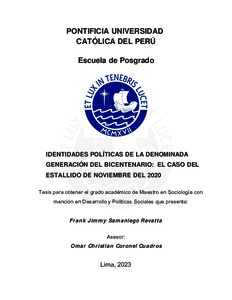| dc.contributor.advisor | Coronel Cuadros, Omar Christian | |
| dc.contributor.author | Samaniego Revatta, Frank Jimmy | |
| dc.date.accessioned | 2024-01-22T15:35:55Z | |
| dc.date.available | 2024-01-22T15:35:55Z | |
| dc.date.created | 2023 | |
| dc.date.issued | 2024-01-22 | |
| dc.identifier.uri | http://hdl.handle.net/20.500.12404/26862 | |
| dc.description.abstract | La presente tesis explora y analiza cómo se formaron las identidades políticas de los jóvenes
que participaron en la marcha del estallido de noviembre del 2020. Para ello emplearemos
una metodología cualitativa que permita conocer las trayectorias de vida durante las
socialización primaria y secundaria de los participantes. Se analizará cómo la estructura
familiar permitió crear un primer discurso identitario en el joven estudiante, el cual fue
reforzado con agencia de por medio durante su etapa educativa y preuniversitaria, lo que
permitió, en términos de Pierre Bourdieu, que el capital cultural adquirido, se convierta en
capital político. A ello se le sumarán momentos críticos vinculados a la crisis política vivida
desde el 2016 hasta la llegada de la pandemia de covid-19 y la vacancia del presidente
Martín Vizcarra, lo que motivó la indignación y participación del estallido de noviembre del
2020 que salió a manifestarse a las calles hasta lograr la renuncia del presidente Manuel
Merino. La participación de dicha marcha, no solo manifestó un cúmulo de descontentos,
sino que esconde una heterogeneidad de discursos políticos, muchos de ellos contradictorios
entre la izquierda-derecha y liberal-autoritaria que esta investigación pretende descubrir y
analizar en una fusión teórica de estructura y agencia, que permita entender cómo se forma
y manifiesta la cultura política de la denominada “generación del bicentenario”. | es_ES |
| dc.description.abstract | This thesis explores and analyzes how the political identities of the young people who
participated in the November 2020 outbreak march were formed. To do this, we will use a
qualitative methodology that allows us to know the life trajectories during the primary and
secondary socialization of the participants. It will be analyzed how the family structure
allowed the creation of a first identity discourse in the young student, which was reinforced
with an agency involved during their educational and pre-university stage, which allowed, in
terms of Pierre Bourdieu, that the acquired cultural capital was become political capital. To
this will be added critical moments linked to the political crisis experienced from 2016 until
the arrival of the covid-19 pandemic and the vacancy of President Martín Vizcarra, which
motivated the indignation and participation of the outbreak of November 2020 that came out
demonstrate to the streets until the resignation of President Manuel Merino. The participation
in this march not only manifested a host of discontent, but also hides a heterogeneity of
political discourses, many of them contradictory between the left-right and the liberalauthoritarian
that this research aims to discover and analyze in a theoretical fusion of
structure and agency, which allows us to understand how the political culture of the so-called
"bicentennial generation" is formed and manifested. | es_ES |
| dc.language.iso | spa | es_ES |
| dc.publisher | Pontificia Universidad Católica del Perú | es_ES |
| dc.rights | info:eu-repo/semantics/openAccess | es_ES |
| dc.rights.uri | http://creativecommons.org/licenses/by-nc-sa/2.5/pe/ | * |
| dc.subject | Juventud--Actividad política--Perú | es_ES |
| dc.subject | Cultura política--Perú | es_ES |
| dc.subject | Manifestaciones--Perú--Siglo XXI | es_ES |
| dc.subject | Perú--Política y gobierno--Siglo XXI | es_ES |
| dc.title | Identidades políticas de la denominada generación del bicentenario: el caso del estallido de noviembre del 2020 | es_ES |
| dc.type | info:eu-repo/semantics/masterThesis | es_ES |
| thesis.degree.name | Maestro en Sociología con mención en Desarrollo y Políticas Sociales | es_ES |
| thesis.degree.level | Maestría | es_ES |
| thesis.degree.grantor | Pontificia Universidad Católica del Perú. Escuela de Posgrado | es_ES |
| thesis.degree.discipline | Sociología con mención en Desarrollo y Políticas Sociales | es_ES |
| renati.advisor.dni | 43007660 | |
| renati.advisor.orcid | https://orcid.org/0000-0002-8521-7449 | es_ES |
| renati.author.dni | 40062834 | |
| renati.discipline | 314587 | es_ES |
| renati.juror | Henríquez Ayín, Narda Zoila | es_ES |
| renati.juror | Coronel Cuadros, Omar Christian | es_ES |
| renati.juror | Chávez Angeles, Noelia Solange | es_ES |
| renati.level | https://purl.org/pe-repo/renati/level#maestro | es_ES |
| renati.type | https://purl.org/pe-repo/renati/type#tesis | es_ES |
| dc.publisher.country | PE | es_ES |
| dc.subject.ocde | https://purl.org/pe-repo/ocde/ford#5.04.01 | es_ES |







